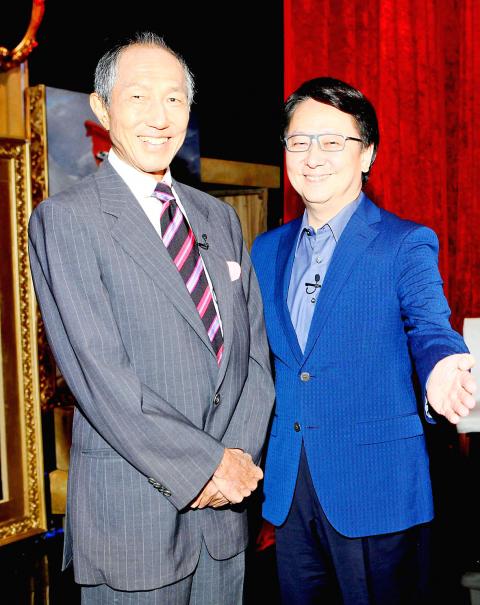Former deputy minister of national defense Lin Chong-pin (林中斌) said that the Chinese People’s Liberation Army (PLA) could conquer Taiwan by force within three days, but added that a peaceful unification between Taiwan and China is likely.
In an interview with the Global Times Chinese daily published yesterday, Lin said that Taiwan’s armed forces could only resist China’s “acupuncture tactics” for 48 to 72 hours, as the PLA could paralyze Taiwan’s command system using electromagnetic weapons and digital attacks.
Democratic Progressive Party Legislator Lo Chih-cheng (羅致政) said it was likely that Lin was quoted out of context, considering the Global Times’ hawkish stance.

Photo courtesy of Public Television Service
“China already has the ability [to carry out acupuncture warfare], which would be quite difficult for Taiwan to withstand,” Lin told the Chinese newspaper. “Taiwan has admitted that [it can only defend itself for] between 48 hours and 72 hours.”
The PLA has also infiltrated Taiwan and Beijing could subdue Taiwan in a bloodless war, he said.
The possibility of US interference in an armed conflict between Taiwan and China has diminished, as China has developed advanced anti-ship missile systems and submarine-launched cruise missiles that can target US aircraft carriers, he said.
However, it is more likely that Beijing would seek peaceful unification with Taiwan, Lin said, adding that it has “super-military measures” — the projection of China’s economic, diplomatic and cultural power predicated on its strong military presence.
China has, without resorting to military means, shifted the Philippines’ tone on the South China Sea issue after the Permanent Court of Arbitration in The Hague ruled in Manila’s favor on the matter and Beijing could seek to exert the same sort of pressure on Taipei, he said.
Unificationist sentiment is on the rise in Taiwan, Lin said.
Despite President Tsai Ing-wen’s (蔡英文) administration beginning to lose support, there is still a trend toward people identifying themselves as Taiwanese, he said.
Lin was a deputy minister of national defense in 2003 and 2004 while former president Chen Shui-bian (陳水扁) was in office.
“In theory, everything is possible, such as seizing Taiwan in three days. However, in reality, [war] is contingent upon a lot of things, including Taiwan’s and the US’ reaction,” Lo said.
So-called “acupuncture warfare,” or decapitation, is one of China’s key strategies and Taiwan has countermeasures in place after years of military exercises, Lo said.
The nation’s armed forces have simulated scenarios in a series of exercises to prepare for a hypothetical PLA attempt to “decapitate” Taiwan or barricade the nation, Lo said.
The former deputy minister could not be reached for comment as of press time last night.
The Ministry of National Defense refused to comment on Lin’s remarks.

CHANGING LANDSCAPE: Many of the part-time programs for educators were no longer needed, as many teachers obtain a graduate degree before joining the workforce, experts said Taiwanese universities this year canceled 86 programs, Ministry of Education data showed, with educators attributing the closures to the nation’s low birthrate as well as shifting trends. Fifty-three of the shuttered programs were part-time postgraduate degree programs, about 62 percent of the total, the most in the past five years, the data showed. National Taiwan Normal University (NTNU) discontinued the most part-time master’s programs, at 16: chemistry, life science, earth science, physics, fine arts, music, special education, health promotion and health education, educational psychology and counseling, education, design, Chinese as a second language, library and information sciences, mechatronics engineering, history, physical education

DEADLOCK: As the commission is unable to forum a quorum to review license renewal applications, the channel operators are not at fault and can air past their license date The National Communications Commission (NCC) yesterday said that the Public Television Service (PTS) and 36 other television and radio broadcasters could continue airing, despite the commission’s inability to meet a quorum to review their license renewal applications. The licenses of PTS and the other channels are set to expire between this month and June. The National Communications Commission Organization Act (國家通訊傳播委員會組織法) stipulates that the commission must meet the mandated quorum of four to hold a valid meeting. The seven-member commission currently has only three commissioners. “We have informed the channel operators of the progress we have made in reviewing their license renewal applications, and

The High Prosecutors’ Office yesterday withdrew an appeal against the acquittal of a former bank manager 22 years after his death, marking Taiwan’s first instance of prosecutors rendering posthumous justice to a wrongfully convicted defendant. Chu Ching-en (諸慶恩) — formerly a manager at the Taipei branch of BNP Paribas — was in 1999 accused by Weng Mao-chung (翁茂鍾), then-president of Chia Her Industrial Co, of forging a request for a fixed deposit of US$10 million by I-Hwa Industrial Co, a subsidiary of Chia Her, which was used as collateral. Chu was ruled not guilty in the first trial, but was found guilty

Taiwan People’s Party (TPP) Chairman Huang Kuo-chang (黃國昌) yesterday appealed to the authorities to release former Taipei mayor Ko Wen-je (柯文哲) from pretrial detention amid conflicting reports about his health. The TPP at a news conference on Thursday said that Ko should be released to a hospital for treatment, adding that he has blood in his urine and had spells of pain and nausea followed by vomiting over the past three months. Hsieh Yen-yau (謝炎堯), a retired professor of internal medicine and Ko’s former teacher, said that Ko’s symptoms aligned with gallstones, kidney inflammation and potentially dangerous heart conditions. Ko, charged with